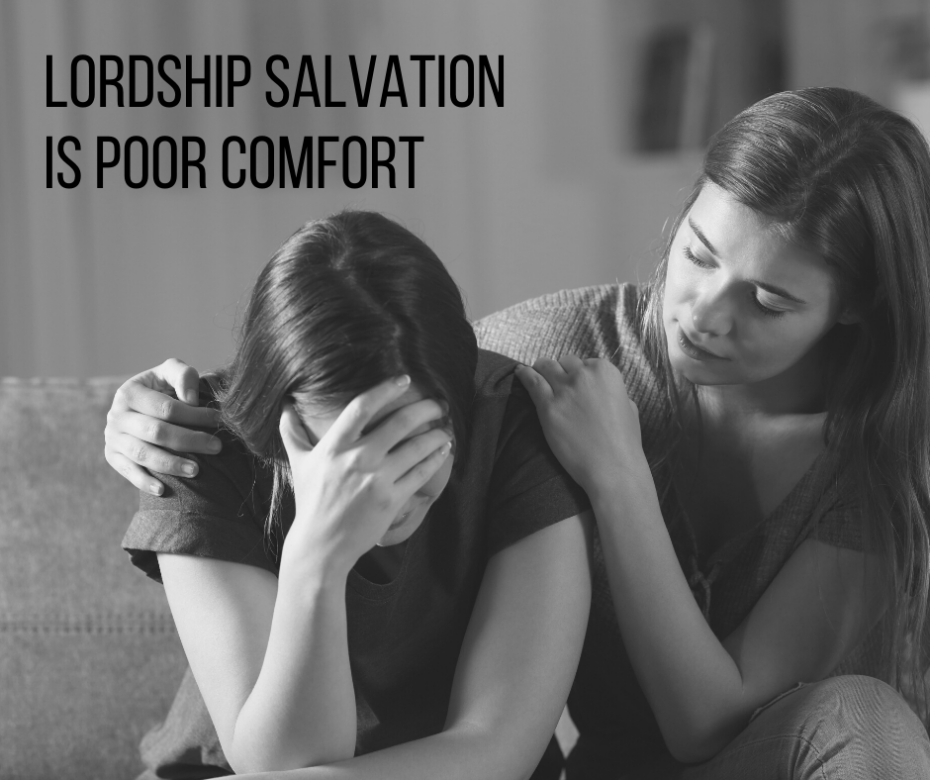This past Sunday, our minivan wouldn’t start, so the kids and I walked to a local church, about a mile away. They protested, feeling it was an exceedingly far distance to travel—“Why is this taking so long? Is this Canada?”
Once we got settled in, I found the preacher was teaching through Job. Unfortunately, having recently taught through Job myself, I started to disagree very quickly! I don’t like doing that. Being a preacher is hard work. We often make mistakes. And I want to give everyone the benefit of the doubt and try to focus on the things I agree with, rather than what I disagree with. But this preacher was going out of his way to show that Job teaches Calvinism (without using the term “Calvinism”), which, I think, is not true at all!
Still, I was willing to give him a break.
Until…
He started talking about believers going through calamity. How should we react? He told the story of talking to two sisters who recognized him at a local Christian bookstore. The sisters asked for advice about their mother who was dying in hospice. They said that caring for their mother was becoming more troubling, not only because she was dying, but because she would say disturbing things. The preacher didn’t give any specific examples of what the dying mother said, but the impression was she was saying unchristian things, and that made it harder on the sisters. The sisters asked what to think of that?
The preacher’s answer was generic—that God is with us during times of calamity, working all things for our good (another misapplication), etc.
But then he went off on a tangent. He started talking about “genuine” faith and “genuine” believers going through calamity. He brought us to Proverbs 24:16:
For a righteous man falls seven times, and rises again, But the wicked stumble in time of calamity.
“Genuine faith always gets back up,” he said. “Genuine believers might fall down and fall again, but they don’t stay down. They get back up—always.”
There seemed to be mumbles of agreement from the congregation—but not from me. Not only was that a misapplication of that verse, I kept thinking about the dying mother. “What about her? She’s falling…but she’s not getting back up!”
It sounded like the mother’s body was shutting down. She was probably delusional and slowly losing her mind. The last words she uttered might have been sinful, even blasphemous, but was she culpable? Not if she was not in her right mind. But even if she were culpable, would her words prove she was not a genuine believer? Would they prove she was never saved to begin with? Are we saved by faith plus keeping our tongue under control until we die?
My friend, pastor Allen Rea, wrote an article about the inconsistencies of Calvinist pastors who believe one thing and yet say another (JOTGES Spring 2018). I doubt the pastor would have said to the sisters: “Oh, your mother is blaspheming? Well, you know the righteous always get back up. So if she doesn’t quit, I guess she’s not a genuine believer and will probably end up in hell. So sorry!” But even if he didn’t say that, that’s what his theology would lead him to believe.
Job once complained about his miserable comforters (Job 16:2), and to me, Lordship Salvation proves no comfort at all.
Regular readers of this blog will no doubt guess what I would have told the sisters—if the mother ever believed in Jesus for eternal salvation, she is eternally saved, no matter what she might say before she dies (especially if she’s losing her mind!).
The pastor did say one good thing worth sharing. This is the gist of what he said. “When a friend is suffering and you try to say something, nine times out of ten you’ll end up with a foot in your mouth. Rather than offer explanations, it’s better to show up, hug them, and say, ‘I love you.’”
To me, nothing says “I love you” more than the doctrine of eternal security. When the righteous fall, maybe that’s what they need to hear most.


